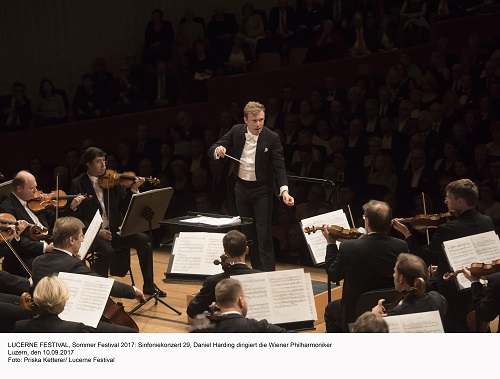
 Switzerland Lucerne Festival [4[ – Debussy, Mahler: Vienna Philharmonic Orchestra / Daniel Harding (conductor) Kultur- und Kongresszentrum Lucerne (KKL), 10.9.2017. (JR)
Switzerland Lucerne Festival [4[ – Debussy, Mahler: Vienna Philharmonic Orchestra / Daniel Harding (conductor) Kultur- und Kongresszentrum Lucerne (KKL), 10.9.2017. (JR)

Debussy (arr. Erich Leinsdorf) – Pelléas and Mélisande Suite
Mahler – Symphony No.6
Not everyone admires Debussy’s opera Pelléas and Mélisande; it’s an acquired taste, a love or hate work, unless you are French. Mahler was supposed to conduct the Viennese première in 1904 but never did. Bruno Walter eventually conducted the opera, but only in 1911, six days after Mahler’s death. Erich Leinsdorf was one of several conductors who arranged a suite (in 1945) long after Debussy’s death. It’s a sort of symphonic poem, but – as with the opera – it lacks drive and floats harmlessly but beautifully along, conjuring up images of shimmering forests and glistening fountains. There is more than a nod to Parsifal. It’s an impressionist musical painting in which no one can clearly see an image; Harding caressed each phrase, with utmost delicacy. Needless to say, the Vienna Philharmonic played it beautifully but looked utterly bored.
After the interval, the reason – I suspect – most of the audience had attended the concert – to hear Mahler’s monumental and “tragic” Sixth Symphony (recently reviewed at the BBC Proms click here). Harding did not disappoint: a cleanliness of approach and lack of neurosis are qualities of Harding’s Mahler – on the downside perhaps, here and there, a slight degree of impatience and a lack of fever pitch. He avoided any extremes of speed and dynamics, his tempi were always judicious. Some may prefer a more jagged approach to the opening march (Rattle perhaps), some more nightmarish tension on the verge of the abyss (Tennstedt, Bernstein), but Harding brought out details I had never heard in the work – and the symphony has been a particular favourite of mine since student days.
Harding’s interpretation had excitement from the opening string march, with just enough bite. Surprisingly, Harding used a score (he says he too was obsessed with Mahler in his student days at Chethams), but hardly looked at the score, having to turn many pages when he finally glanced down.
Harding followed Mahler’s instructions about which movement to play second and which third: slow movement first, then the Scherzo. There should not be any confusion here, as Mahler never conducted the symphony any other way.
The Vienna Philharmonic played like a dream, lush strings, golden brass, mellow woodwind and crisp rhythmic percussion. The instruments gleamed, the patent leather shoes (to a man) shone. They hardly ever smiled, but they had no need. I counted 112 musicians of whom there were 16 women, none in the brass, only one in the woodwind and none anywhere near a Principal’s chair or front desk. I suppose it’s an improvement over previous years, but a slow one.
The off-stage cowbells were hardly audible in the first movement, invisible when finally played on stage and often sounded like the clatter in a kitchen sink. They are frequently a problem in concert; recording engineers can play around with their controls so we hear them clearly on record, a luxury conductors do not have, especially when on tour, changing halls every night.
The two huge wooden sledgehammer blows, probably the strokes of fate in Mahler’s life at that time, were a visual and aural treat, though perhaps not quite as dull a thud as an older hall such as the Concertgebouw or Zurich Tonhalle can engender. Harding was especially cogent in this final movement and he left the audience hanging in the air after the final note for quite a time, before allowing applause. There was hardly a standing ovation, and I put that down to Harding’s relative lack of charisma and stature; he still looks youthful and a mite unsure of himself. He was Abbado’s protégé for many years and is now starting to enjoy his golden middle years of a conductor’s life, the years between 40 and 60. The fact that the Vienna Philharmonic chose him to conduct the Last Night of the Lucerne Festival, and his position as Chief Conductor of the Orchestre de Paris, are testament to the esteem in which musicians hold him. The international music-loving public have, however, yet to warm to him. But I think they will and certainly should, particularly when Mahler is on the programme.
No balloons and silly noises then for the Last Night in Lucerne, no flags, no jingoistic songs of course – instead a first-rate performance of a marvellous symphony. Did we really need the Debussy?
John Rhodes